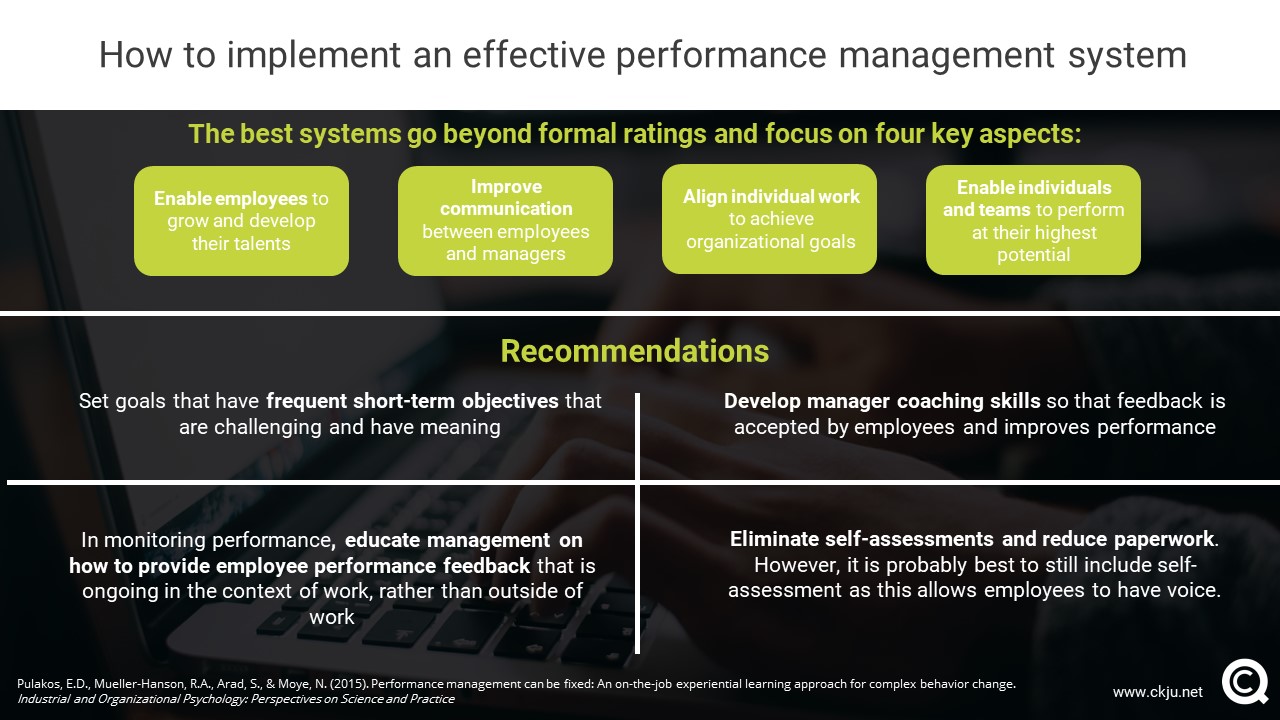- All Management Learning Resources
- Effective Performance Management

Executive summary
This CQ Dossier focuses on effective performance management and how organizations can initiate an effective performance management system that allows both managers and employees to strive for excellence. The dossier describes the features of an effective performance management system and describes how the system can be linked to an organization’s mission. The objective of performance management systems is to provide performance feedback to employees so that they are effective in their jobs.
Contents
- Executive summary
- Effective performance management has to adhere to psychological principles
- Performance management systems enhance organizational effectiveness by aligning individual, team and strategic goals
- Effective performance management requires year-round conversations with employees
- Employees' reaction to feedback is important for performance improvements
- Having more than one rater is important for an effective performance management system
- Utilize effective performance rating scales
- Effectiveness performance management involves coaching, feedback and management support
- Recommendations to create an effective performance management system
- Performance management systems and goal setting
- Key take-aways
- References and further readings
Some critics have argued for the elimination of performance management systems because the research has found that many principles fail to deliver effective employee performance. This CQ Dossier critiques the research and provides recommendations for best practices in creating an effective performance management system. We review the characteristics of an effective performance management system and provide recommendations on how organizations can implement a performance management system that is based on scientific principles.
Effective performance management has to adhere to psychological principles
Organizations like Google have changed their performance appraisal system through abandoning traditional annual performance reviews and merely focusing on engaging in conversations with employees. However, there is no empirical research evidence that these new industry trends work and experts have advised HR professionals to adhere to sound psychological principles that inform effective appraisal systems (Rotolo et al., 2018). These psychological principles include the need for feedback on performance and the ability to have voice in the process.
While it is true that performance appraisal ratings do have limitations such as rater bias, there are also benefits to implementing or improving a performance appraisal system that relies on ratings (Adler et al., 2015). Proponents for performance appraisal believe that it is too easy to give up the progress that has been made (Adler et al., 2015).
Performance management systems enhance organizational effectiveness by aligning individual, team and strategic goals
An effective performance management system ensures that there is a continuous process of performance enhancement through setting individual and team goals that are aligned with the strategic goals of the organization. This involves reviewing and assessing performance and ensuring the training and development of knowledge, skills, and abilities (Kozlowski, 2012).
Effective performance management requires year-round conversations with employees
There are several indices that denote an effective performance management system (CEBMA, 2016). First, it is important to have year-round conversations with employees rather than a single annual performance review. When managers actively engage in conversations, this prepares the employees for performance feedback and they are more likely to accept the feedback that they receive because they have discussed their continuous progress with their manager.
Employees' reaction to feedback is important for performance improvements
One of the most important elements of effective performance review is that employees accept and react positively to feedback, especially when the feedback includes constructive criticism (Murphy & Cleveland, 1995). It is not the performance feedback per se that is important but employees’ reactions to the feedback. Consequently, an effective performance management system includes an annual performance evaluation, along with ongoing discussion with employees to help strengthen relationships between management and employees (CEBMA, 2016).
Having more than one rater is important for an effective performance management system
The second feature of an effective performance management system is the use of more than one rater within the system (CEMBA, 2016). Inclusion of an external reviewer to assess performance tends to motivate employees to do well mainly because assigned goals are more effective than self-assigned goals (Harkins & Lowe, 2000). Based on principles of procedural justice, it is important to provide employees with feedback because people have an intrinsic need to know how their employer views them and their performance.
Incorporating a feedback system into performance appraisal also allows for employee autonomy and control because employees can voice their opinion and respond to feedback. This ensures that conversations between managers and subordinates are a two-way path and this is important in the development and training of employees when developing targets (Colquitt et al., 2001). It also fosters a speak-up culture in your organization which has a positive impact on organizational performance.
Utilize effective performance rating scales
The final feature of an effective performance management system is to utilize effective rating scales that capture the full range of employee performance. For example, ratings scales with five categories are best with forced categories found to be inferior (CEMBA, 2016). Forced categories is a performance appraisal method in which the rater has to make a forced choice between available characteristics about employees. For example, the rater might be asked to choose between one of two characteristics such as ‘Takes up challenges eagerly’ or ‘always comes up with new ideas.’
Management skills newsletter
Join our monthly newsletter to receive management tips, tricks and insights directly into your inbox!
Effectiveness performance management involves coaching, feedback and management support
An effective performance management system transcends an annual review through inclusion of coaching, feedback and management support to enhance employee performance. An effective performance management system ensures that individual and team goals are aligned with organizational goals so that performance at both the individual, team and organizational level are enhanced through effective implementation of human resource management practices. The best systems go beyond formal ratings and focus on four key aspects:
- Enabling employees to grow and develop their talents;
- Improving communication between employees and managers;
- Aligning individual work to achieve the organization’s goals;
- Enabling individuals and teams to perform at their highest potential (Pulakos et al., 2015).
Recommendations to create an effective performance management system
Pulakos and colleagues provide several recommendations to create an effective performance management system that is aligned with individual and organizational goals (Pulakos et al., 2015).
- First, in setting goals, set ones that have frequent short-term objectives that are challenging and have meaning.
- Second, in monitoring performance, educate management on how to provide employee performance feedback that is ongoing in the context of work, rather than outside of work.
- Third, it is important to develop manager coaching skills so that feedback is accepted by employees and improves performance (Pulakos et al., 2015).
- Finally, the authors also recommend eliminating self-assessments and reducing paperwork. However, it is probably best to still include self-assessment because this allows employees to have voice although the reduction of paperwork is advantageous.
Performance management systems and goal setting
Performance management systems strongly rely on goal setting and goal alignment between individuals, teams and strategic organizational goals. There is considerable evidence that goal setting has a positive impact on job performance (Locke & Latham, 2002). However, there are also some side effects associated with goal setting you should be aware off. In addition, when there is high task interdependency team goals are more appropriate than individual goals.
In conclusion, this CQ Dossier describes the components of an effective performance management system. These elements are important in creating a performance management system that links key human resource practices such as performance review, employee training and development, compensation, and talent promotion.
Key take-aways
- Set individual and team goals that are aligned with the strategic goals of the organization
- Have year-round conversations with employees rather than a single annual performance review
- Have more than one rater within the system and reduce paperwork involved in ratings
- Have a rating system that involves a wide range of categories rather than forced categories
- Have frequent short-term objectives that are challenging and have meaning
- Develop manager coaching skills to provide effective feedback
References and further readings
Adler, S., Campion, M., Colquitt, A., Grubb, A., Murphy, K., Ollander-Krane, R., & Pulakos, E. (2015) Getting rid of performance ratings: genius or Folly? A Debate. Industrial and Organizational Psychology: Perspectives on Practice and Science, 9, 2.
Center for Evidence-based Management (2016). Could do better? Assessing what works in performance management.
Colquitt, J. A., Conlon, D. E., Wesson, M. J., Porter, C. O., Ng, K. Y. (2001) Justice at the millennium: a meta-analytic review of 25 years of organizational justice research. Journal of Applied Psychology, 86, No 3. p425.
Kozlowski, S (2012). The Oxford Handbook of Organizational Psychology, 1, Oxford University Press, New York.
Locke, E.A., & Latham, G.P. (2002). Building a practically useful theory of goal setting and task motivation: A 35-year odyssey. American Psychologist, 57, 705–717.
Murphy, K.R. and Cleveland, J. (1995) Understanding performance appraisal: social, organizational, and goal-based perspectives. London: Sage.
Pulakos, E.D., Mueller-Hanson, R.A., Arad, S., & Moye, N. (2015). Performance management can be fixed: An on-the-job experiential learning approach for complex behavior change. Industrial and Organizational Psychology: Perspectives on Science and Practice.
Rotolo, C. T., Church, A. H., Adler, S., Smither, J. W., Colquitt, A. L., Shull, A. C., Paul, K. B., & Foster, G. (2018). Putting an end to bad talent management: A call to action for the field of I-O Psychology. Industrial and Organizational Psychology: Perspectives on Practice and Science, 11, 1.
About the Author







